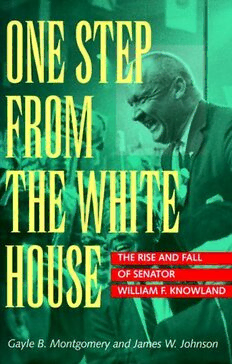
One Step from the White House: The Rise and Fall of Senator William F. Knowland PDF
232 Pages·1998·2.161 MB·English
Most books are stored in the elastic cloud where traffic is expensive. For this reason, we have a limit on daily download.
Preview One Step from the White House: The Rise and Fall of Senator William F. Knowland
Description:
During the Cold War years of the 1950s, William F. Knowland was one of the most important figures in American politics. As the Republican leader of the U.S. Senate, the wealthy California newspaper heir was recognized and respected by millions. His influence with President Eisenhower led to Earl Warren's appointment as chief justice, and Knowland set in motion a U.S.-China policy that remains part of our international direction today. Yet he committed suicide in 1974, following a personal decline that included political humiliation, a ruined marriage, and the loss of his family fortune.This is the first full-scale biography of Bill Knowland, written by two journalists who came to know him after he left Washington in 1958. Gayle B. Montgomery was a political editor at the Oakland Tribune, the newspaper owned by Knowland's father, the power-wielding Joseph R. Knowland. James W. Johnson was a Tribune editorial writer. Both men worked with Knowland when he returned to the newspaper after giving up his Senate seat in a failed bid to become governor of California. Knowland lost the governorship race to Edmund G. (Pat) Brown; had he won, many observers felt Knowland would have had a clear shot at the White House.This is a book not only about Mr. Republican, but also one that illuminates the strengths and deficiencies of Republican party politics during the years when the party was at its zenith. In portraying the life of Bill Knowland, the authors cast a glaring light both on the machinations of political power and on the Republican establishment's aspirations in the Warren-Eisenhower era.
See more
The list of books you might like
Most books are stored in the elastic cloud where traffic is expensive. For this reason, we have a limit on daily download.
